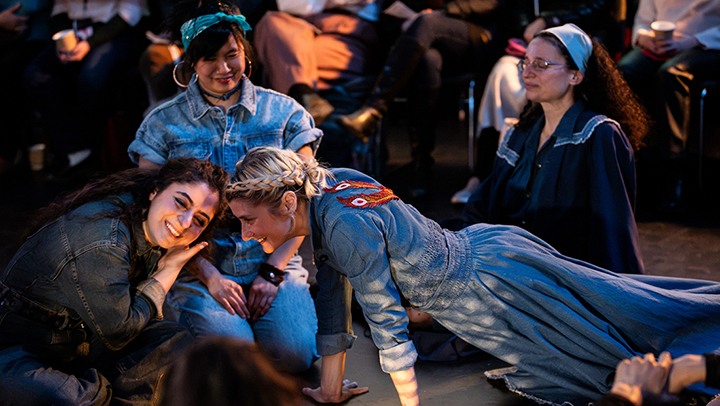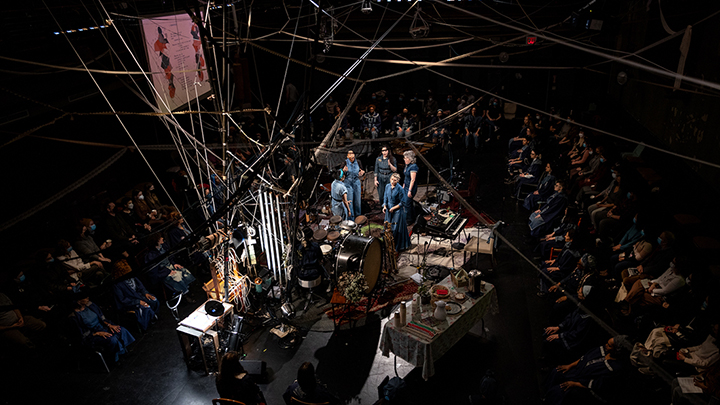Ropes hung from the ceiling, like a climbing gym, or perhaps a ship about to set sail.
Written, composed, and performed by Christian, Terce is a reimagined “breviary” mass. The work of “music-theater,” directed by Keenan Tyler Oliphant, is described as “more of an event than an opera.” (After making its world premiere on January 10, Terce’s run has now been extended through February 4.)
Though inspired by the “divine feminine,” the production, commissioned by the HERE Arts Center, is notable for its gender diversity (with lots of queer and trans people, all of whom identify with “femininity” in some way).
There was a refreshing lack of slickness to the 40-person community chorus, in tattered denim choir robes, whose individual voices you could hear as they got close. Christian acted as the ring-leader, belting as she patted her chest, a visceral and unbridled sound. She was joined by vocal soloists Rima Fand and Jessica Lurie, who doubled on other instruments.
Credited in the program as an “instrument fabricator” was Terry Dame, who also acted as the fedora-ed percussionist, banging on literal pots and pans. The strong string section included Viva DeConcini on electric guitar, Maya Sharpe on violin and acoustic guitar, and Mel Hsu on cello and bass. They were bolstered by Mona Seyed-Bolorforesh on piano.
Even the supertitles, so often distracting in opera productions, were delightful. In keeping with the “book of hours” theme, they printed on a modern-day illuminated manuscript. Its hand-turned pages (illustrated by Alice Leora Briggs, Koomah, and Lovie Olivia) shown on an overhead projector.
The Medieval influence was especially audible in “Oratio,” with bells, organum, and hand solfège, as well as in “Oh Shepherdess,” an adaptation of Hildegard von Bingen. Other parts of the libretto were adapted from Julian of Norwichand Robin Wall Kimmerer.
Dame’s title of “instrument fabricator” started to make more sense when a whole slew of noisemakers were lowered on pulleys. Boots on a stick, jingling johnnies, rolling pins. You could feel the stomping in the floor. This was followed by choreographed “digging” in “Gardener,” as well as some actual loose soil, which was noisily vacuumed up, somewhat interrupting the soulful soloist in “Poppyseed.”
Indeed, there was a lot of silliness in Terce: the chorus acting “out of breath,” bird sounds, vocalizations that I could only transcribe as “goom-kh-kh-kh.” One tongue-in-cheek lyric acknowledged this: ‘These people are not drunk because it’s 9 in the morning.” Singing “gravity is holy,” some ascended the scaffolding, with flamenco-like dancers spinning in moving-blanket skirts.
But there was also grief: cacophony and commotion in “And then I lose it,” building to “Hear me, save me, heal me,” with a gorgeous baritone and soprano saxophone duet. The rapid-fire solos in “Kyrie” felt like affirmations. Lyrics like “one year sober,” “a day in bed,” and “Mozart, Beethoven, Einstein, von Bingen,” interspersed with shouts of “Mother!” These were interrupted by what could only be described as a chandelier on a bungee cord, its tinkling slowly fading to quiet.
But Terce wasn’t over. To sun-warmed chords, the chorus sang, in the “Recessional”: “I have no artistic restraint./ Everything I see, I paint/ with the image of myself./ I am the vine.”
Maybe restraint is overrated.
Photos: Maria Baranova





